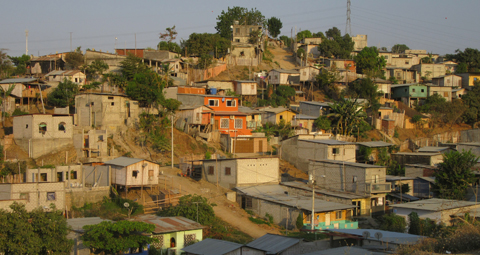September 7 | ![]() 0 COMMENTS
0 COMMENTS ![]() print
print

Nothing but Faith; Poverty and Piety in Ecuador
— By Fr Martin Chambers
ON April 1, 2016, Sr Clare Crockett from Derry was taking the guitar class in the convent school of Playa Prieta, Ecuador where she taught. Without warning, an earthquake struck, causing death and destruction throughout north-western Ecuador.
Tragically, Sr Clare and five novices died in the rubble of the school buildings that day. The official total of those who died was 654, although it is estimated to be more like double that figure.
Since that day, Sr Clare’s story has been told far and wide: how she lived through the Troubles in Derry; how she was, by her own admission, a ‘wild child’; how she gave her life to God by entering the convent with the Servant Sisters of the Home of the Mother; and tragically how she died aged 33 doing what she did best—teaching others through the medium of the guitar.
When I visited Ecuador in June of this year with friends from Coatbridge, we travelled to Playa Prieta to be with the community where Sr Clare had lived and to see how her community was recovering from the tragedy.
From the moment we stepped into the schoolyard, I had a sense of God’s presence: there where the four-storey school had once been was now a small but dignified school chapel. The Sisters had asked me to celebrate Mass with them and, when our Mass began, I had an incredible feeling of being on sacred ground. This was where Sr Clare and her five companions died, and here we were celebrating Christ’s Death and Resurrection in the Mass on that very spot.
It was a rare moment when I was moved to tears and I heard the words deep in my heart: ‘Take off your shoes, you stand on holy ground.’ To tip me over an emotional edge, the Ecuadorian Sisters sang (in perfect English and in tribute to Sr Clare) Our Lady of Knock, Queen of Ireland.
This was the first of many moments when I was moved deeply during the visit to Ecuador—moments when I was left in admiration of so many who were living tragic lives, especially as a result of poverty, and yet were living with great hope and tremendous dignity.
I travelled for the two-week visit with Joe Bradley and two of his daughters, Ciara and Aoife. Our first task was to go to the earthquake zone, where we were going to build two houses.
These two houses were some of the many that Scots had donated after the earthquake through the Ecuador Trust. When I say ‘build a house,’ I should say that these houses are simple wooden structures and, in Scotland, would be two or three times the size of a regular garden shed.
In any case, our first task was to help Nieves, a middle-aged woman, rebuild her family home. For two years she had been living with her daughter, Maria, in a corner of their plot under an arrangement of tin sheets.
I was going to say ‘they had been living in a tin house’ but it was really just several old sheets of tin which had been cobbled together.
It was that fact alone which forced me to put my back into building their new home. Truth be told, I was not very good at the task in hand; I realised after two botched attempts that I couldn’t even nail two planks of wood together. Joe was much better than I was. So, along with Ciara and Aoife, I ended up lifting the heavy wooden boards and holding them in place, while Nieves’ two nephews nailed them together.
Once they were in place, we were able to paint the interior and make it habitable. After two days of lifting, nailing and painting, Nieves and her daughter, Maria, now have a dignified house. So much better than the tin arrangement they had lived in for two years!
Yet at the same time, they were still living in abject poverty—no real income and no prospects for the future.
As we went through the earthquake zone, the same Scripture passage kept coming back to me: ‘Take off your shoes, you stand on holy ground.’ We kept meeting people in such humble houses, people who had such great dignity in the midst of great poverty.
We visited Jenaro and Gladys who live in a dirt-floored, bamboo house with their teenage son, Edison. Their other son, Jaime, had been killed eight days previously in a gangland killing in the capital, Quito.
Jaime had been invited by a friend to visit Quito for a few days’ holiday but had simply been in the wrong place at the wrong time.
What struck me about his parents’ reaction was that they were not bitter; they were people of deep Faith who talked about the Resurrection of Christ and how their son was now sharing in that with Christ. No bitterness—just deep Faith.
We also visited Rosalina, a 90-year-old lady who lived on her own in a ramshackle dwelling. When we visited her, she was recovering from scalding herself with hot water; because of her poverty, she could not afford adequate treatment for her recovery and was lying at home waiting for the wound to heal.
To add to her woes, her son—her principal carer—has just been diagnosed as diabetic and was going blind.
I could go on and on, visit after visit, family after family, but each time I felt we were being invited by God to reflect on His presence amongst these poor people before us. People who had nothing but had everything: nothing materially but such great generosity in their hearts. As we moved south to Guayaquil where I had lived for five years, Joe Bradley summed up what we were all feeling: “It is clear that many of the people in Ecuador live in abject poverty.
“If such people were provided with the resources to improve their financial situation then they would no doubt be able to improve their quality of life—access to better housing, better quality of food, running water, plumbing.
“However, the poverty in which these people are living is in a purely financial and material sense. In every other capacity, the people who we met are upbeat, grateful, inspirational and completely appreciative of everything that they do have. These are qualities that people in Western societies often lack and we could learn a lot from the people of Ecuador.”
One of the highlights of our visit to Guayaquil was the 15th anniversary party for our parish school of Sagrada Familia. In Latin America, it is the 15th birthday (more than the 18th or 21st) which is celebrated as the ‘coming of age.’ The significance of this for the school was that it was now so well-established within the shanty town as to be recognised as the best school in the area, both in terms of the building structure and the quality of education and care given to pupils.
Once again, it was the people we met in Nueva Prosperina who touched our hearts. In bamboo houses we were deeply moved to see how poor some of our friends were, how challenging their lives were and yet how happy and content they seemed.
Gisella Vidal stands out as the shining example of those qualities. She lives in a small bamboo house with her nine children—the eldest being 21 years old. Eight years ago her husband died, leaving her with no income and struggling to bring up her children. She managed to get work at Sagrada Familia School, in the kitchen.
To make the struggle worse, her family lives in an area ravaged by crime and drugs and her fear is that the children will be caught up in the gangland activity.
When we visited her home, I was heartbroken at the poverty of the bamboo house—no proper beds, no real kitchen and while we were moving around the cramped space, she nearly went through the fragile floorboards.
I wasn’t sure what to say or do. I offered a prayer and, as I finished, Gisella said: “God will protect me and protect my children.”
That night Ciara reflected on our visit to Gisella: “Their housing and family situation was horrendous. It was obvious that some financial assistance would help alleviate some of their suffering.
“The money required to facilitate this would amount to only a few months’ wages for many people in the UK. This is a pretty shocking thing to imagine—particularly when you think about the money in which we waste on pointless, trivial material things.”
We were also in admiration of our hosts: headteacher Adela, and her husband, Washington. During our time in Nueva Prosperina, while we were given a small classroom to stay in with good beds and a shower to use each day, they slept on the floor of the school office; giving up their home comforts so they might be near us, making sure we were safe and secure.
They walked with us everywhere, looking out for our every need. We only found out how much they had given up towards the end of our stay—they refused to give way to our protests that it was us who should have slept on the floor.
During our visit Adela spoke about continuing to be headteacher at Sagrada Familia, how she loved being there and how, although she could have moved on to a better-paid job, she stayed to serve the community she loved. She felt Christ was on the faces of the children in the school. When we got home to Scotland, Aoife wrote: “Adela and Washington were as memorable as any Ecuadorians we met, though this was in a different sense. Their willingness to sacrifice a potentially better quality of life for the children of Nueva Prosperina is nothing short of inspiring.
“Their passion for life and for helping others in the simplest means are qualities which we should all aspire to have.”
Whether it was in the convent school of Playa Prieta where Sr Clare died, or in the homes of the people who had suffered so much in the 2016 earthquake or in the homes of Nueva Prosperina, we all found ourselves reflecting that we were in admiration of so many people who knew what life’s struggles were.
Materially they have so little, yet they seem to have bigger hearts than any of us in Scotland could hope for. All of them have great Faith in the midst of life’s pain. Time and again, they invited us to direct our gaze back to God and to Jesus; to His love, peace and hope. For that reason, in every house I visited, I kept coming back to the phrase: ‘Take off your shoes, you stand on holy ground.’
— The Martin Chambers Ecuador Trust continues to support the people and communities throughout Ecuador. Any donations can be sent to Fr Martin Chambers, St Matthew’s Church, Grassyards Road, Kilmarnock KA3 7SH.











